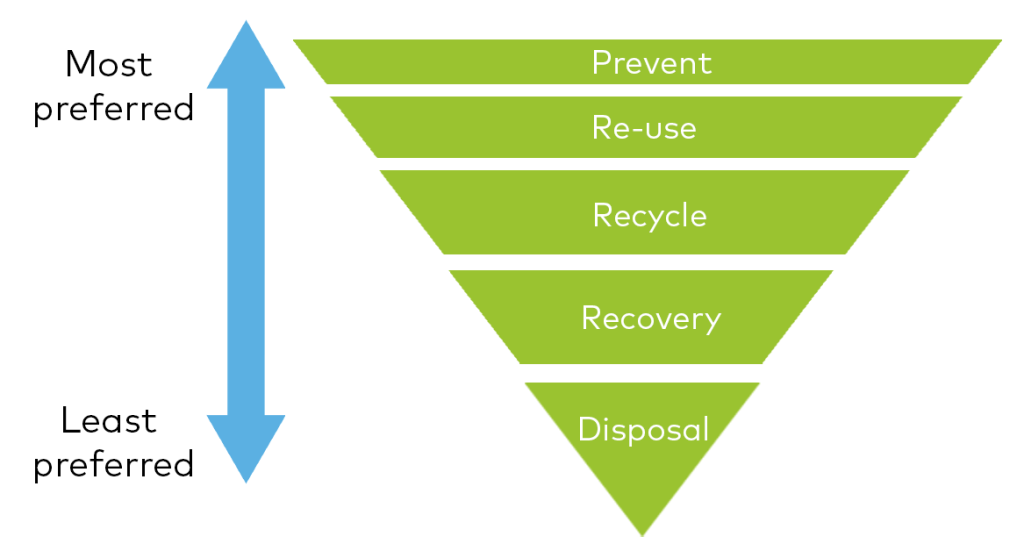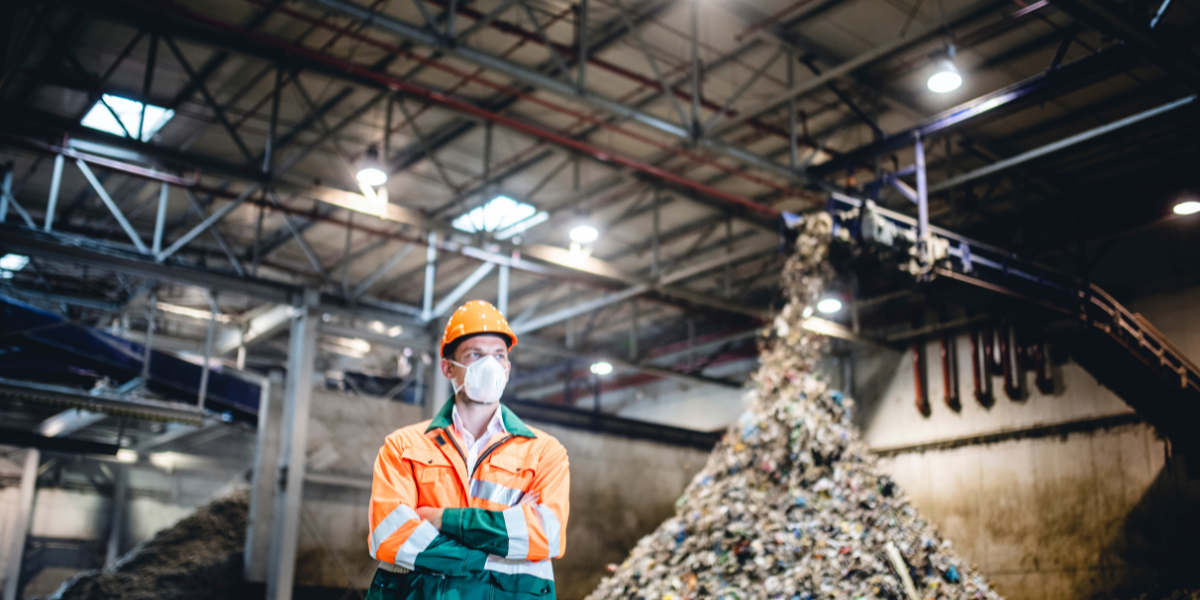Introduction
Waste management plays a crucial role in business operations, irrespective of their size and industry. Implementing an effective waste management strategy can diminish your environmental footprint and ensure compliance with UK waste regulations, enhancing your company’s efficiency and profitability.
Waste management’s significance in businesses primarily stems from its environmental implications. With a rising focus on environmental sustainability, customers demand companies be accountable for their waste production and disposal. Companies failing to manage waste efficiently can face public backlash and potential legal repercussions, damaging their overall reputation and profitability.
Moreover, adopting appropriate waste management practices can lead to significant cost savings for businesses. Companies can enhance their revenue streams by minimising waste generation, cutting down disposal costs, and capitalising on recycling, energy recovery, and other waste reduction programs.
To effectively manage waste, it’s essential for businesses to devise a waste management strategy tailored to their unique requirements.
Understanding a Waste Management Strategy
A waste management strategy is a detailed document that describes the steps a business will implement to minimise waste generation, cut down waste disposal costs, and comply with environmental regulations in the UK.
Creating a waste management strategy involves identifying the types and quantities of waste generated by your company, evaluating existing waste management practices, and pinpointing areas for improvement. The strategy should also include targets for waste reduction, along with techniques for monitoring and assessing the efficiency of the waste management program.
In this blog, we’ll delve into everything you need to know to formulate an effective waste management strategy, along with some handy tips for business waste management.
Business Waste Responsibilities
Before outlining how your business can develop an effective waste management strategy, it’s vital to comprehend the legal responsibilities businesses have in the UK concerning waste disposal.
Your business is obligated to:
- Minimise waste generation by following a waste hierarchy.
- Safely and securely sort and store waste.
- Complete a waste transfer note for each load of waste leaving your business premises – this should be provided by your waste supplier.
- Ensure your waste carrier is officially registered to dispose of waste.
- Prevent your waste carrier from disposing of waste illegally.
If your business generates any hazardous waste, additional responsibilities may apply.
Having discussed these key points, we’ll now delve into the specifics of developing an effective waste management strategy for your business.
Performing a Waste Audit
The first step to managing waste effectively involves understanding the type and source of waste generated by the business. Undertaking a waste audit is a crucial step in this direction.
In this section, we’ll outline what a waste audit is, and the subsequent sections will guide you through conducting one.
What is a Waste Audit and Why is it Important?
A waste audit involves collecting and analysing data on the types and quantities of waste generated by your business. The objective is to identify areas within your business where waste generation can be minimised or even eliminated. The benefits include cost savings, environmental advantages, and improved organisational efficiency.
A waste audit is essential to an effective waste management strategy for several reasons. It provides a clear understanding of a company’s waste generation and disposal practices, allowing for the identification of potential improvements. It also aids in adhering to UK environmental regulations and reducing environmental impact. Finally, a waste audit can lead to cost savings by pinpointing areas where waste generation can be minimised or eliminated.
Identifying Waste Streams
Recognising waste streams within your business is a critical component of your waste management strategy and forms the first step of your waste audit. This task helps identify the amount of hazardous and non-hazardous, solid, and non-solid waste produced by your business.
This information enables your organisation to establish a targeted waste disposal approach for each identified waste type and to ensure compliance with relevant UK regulations.
By identifying the various waste streams, you can further categorise your waste into more specific categories such as organic waste, biologically contaminated waste, electronic waste, and so on.
Certain waste streams may require specialised waste service providers for safe disposal. This will help manage the risks associated with these types of waste and ensure responsible disposal practices.
In identifying the different types of waste streams in your business, consider the following:
- Identify the different types of waste generated by your business, such as paper, plastic, metals, food waste, hazardous waste, etc.
- Determine the quantity of each waste type produced. This information can help pinpoint areas where waste reduction or recycling or composting programs could be implemented.
- Ascertain the origin or waste within your business operations. This can guide your waste reduction efforts.
- Determine current waste handling and disposal practices, including existing recycling or composting programs, and how hazardous waste is managed and disposed of.
- Identify relevant UK waste regulations and compliance requirements for handling and disposing of different types of waste that apply to your business.
By collating this information, you can gain a comprehensive understanding of the waste streams generated by your business and identify potential improvements. This can assist your business in reducing waste, saving money, and improving your environmental footprint.
Developing Waste Reduction Strategies
After identifying all waste streams in your business, you can start devising a waste reduction strategy tailored to your organisation’s specific needs.
In this section we’ll discuss implementing a hierarchy prioritising sustainable waste management practices such as recycling and reuse, as opposed to landfill options based on the 4 Rs of waste management.

Reduce:
Begin by investigating areas in your business where waste generation can be curbed. It could be possible that your business is procuring more materials than necessary. Engage with your team to brainstorm ways to lessen the volume of sourced materials, thus decreasing the waste produced by your organisation.
Reuse:
Explore if there are any waste forms your business produces that could find a new purpose. If, for instance, you’re operating within the construction industry, you might discover opportunities to reuse surplus materials from construction sites or repurpose materials from demolitions.
Recycle:
Identify the forms of waste that can be redirected from your disposal streams for recycling purposes. For instance, consider sending old electronics to specialised waste facilities instead of the landfill, where they can be dismantled, and their components recycled. Materials like paper, glass, metal, or plastic products should already be a part of your recycling program.
Recover:
Consider the potential for certain waste products to be reclaimed for resales, such as through energy recovery or solid waste recovery. This could incorporate waste such as construction debris, electronic components, and organic or bio-waste.
Dispose
Finally, waste that remains after exhausting the above options will likely need to be directed to a landfill or subjected to specialised disposal services if it’s deemed hazardous. By instituting effective waste management practices, you can significantly cut down the waste that ends up in the disposal category, thus facilitating the formulation of conscientious disposal strategies.
The implementation of recycling programs, reducing the use of single-use plastics, and purchasing recycled-material-made products can help businesses meet their waste reduction objectives while also enhancing their bottom line.
Reviewing Current Waste Disposal Practices
The subsequent step involves assessing all your current waste disposal practices. Your organisation should scrutinise the performance of your waste disposal methods, including:
- Placement and labelling of different bin types (general waste, split recycling, etc.)
- The reliability of your business’s waste disposal service.
Understand where your organisation excels, and which areas need enhancement in waste disposal. For instance, poor signage or a lack of recycling bins may lead to more rubbish ending up in general waste. Alternatively, your organisation might be managing its waste efficiently, but poor service from your waste disposal provider results in waste pileups.
Employee Training for Waste Management
Employee education for waste management is a vital element of any waste management plan. Without proper training, employees might overlook the significance of waste reduction, recycling, and appropriate disposal practices, possibly posing health and safety hazards when handling hazardous waste.
Employee Waste Management Training Importance
Employee training is crucial to ensure everyone in the organisation grasps the business waste management plan and their roles in its execution. Training can help employees understand the significance of waste reduction, how to sort waste properly, and how to handle hazardous waste.
Empowering your employees with training helps them take ownership of waste reduction and aids in accomplishing the company’s waste reduction objectives.
Developing Effective Waste Management Training
- Tailor the training to the employee’s specific job functions:
Employees are likely to engage more when they understand how training relates to their specific job functions. Customising the training to various departments or roles ensures that employees grasp how waste reduction practices apply to their work.
- Use Visual Aids are Interactive Activities:
Visual aids and interactive activities, such as videos, infographics, and group exercises, can facilitate better engagement with the training material and understanding of key concepts. Incorporating diverse learning styles ensures comprehensive participation and improved retention of vital information.
- Sustain the Training through Continuous Communication and Feedback:
Training should not be a one-time event. To ensure consistent adherence to waste reduction practices, maintain training through ongoing communication and feedback. This could include regular reminders, signage and feedback mechanisms like forums or suggestion boxes.
Employee training is an essential part of any waste management plan. By developing and delivering effective waste management training, businesses can ensure that all employees comprehend the significance of waste reduction and are equipped to take ownership of waste reduction practices.
Establishing a Waste Management Team
Once your employees have received proper training on waste management practices, identify employees from each relevant department to form a competent waste management team. For more complex responsibilities, consider designating a waste management coordinator.
Assigning team members to oversee specific waste streams enhances accountability in waste management. Without explicit responsibility, waste management can be overlooked. A dedicated team ensures the implementation of strict protocols and deadlines for efficient and comprehensive waste management.
If you require assistance in developing effective waste management training, Unyfi can support you by providing training documents or aiding in training session development.
Setting Waste Reduction Targets
As a part of your new waste management strategy, you should set goals for your organisation. Before implementing new waste management strategies, it’s essential to measure and quantify your existing waste management practices, creating a benchmark for improvement.
After establishing this, you can set targets for your business to achieve. For example, you might aim to reduce waste volumes by 15% or maintain regulatory compliance for a certain period.
Celebrate achieving your targets with your team and then set new goals, progressively enhancing your business’s waste management operations.
Developing a Waste Management Action Plan
Having followed all the steps discussed in this blog, you should consolidate everything into a comprehensive waste management action plan document accessible to employees as needed.
Your action plan should detail specific procedures for segregating various types of waste generated by your business, assigning waste to designated containers, and scheduling disposal pickups.
Furthermore, the plan should include procedures to ensure compliance and handle the procurement of necessary personal protective equipment, protecting employees from hazardous waste.
Monitoring and Evaluating the Plan
Regular assessment of the waste management plan is crucial to ensure its effectiveness and achievement of objectives. Regular reviews allow for adjustments, ensuring the plan remains relevant and addresses new challenges or opportunities that arise.
A key benefit of monitoring and evaluating the waste management plan is the ability to track waste reduction metrics. These metrics highlight successful areas and where improvements can be made.
Conducting follow-up waste audits can help identify areas where waste management practices are not meeting their objectives, and where enhancements can be made.
Collecting feedback from employees and other stakeholders is also crucial in evaluating the plan’s effectiveness. Solicitating feedback can identify areas requiring additional training or education and ensure collaborative work towards the common goal of effective waste management.
At Unyfi we advise following all the points we’ve discussed throughout this guide as thoroughly as possible to ensure you get the best results from your site waste management plans. We are best set to work with your business as an effective waste management partner to ensure that your waste is dealt with properly and in a timely manner.
If you’re still unsure about waste management best practices for your business, or you’d like some advice on waste management, get in touch and one of our specialists can take you through the best options to meet your business goals.




Share this article